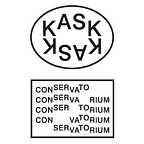Graduation 2023: Marah Haj Hussein
Marah Haj Hussein is a Palestinian, who was born and grew up within the borders of Israel and now lives in Belgium. With four languages (Arabic, Hebrew, English and Dutch) and three alphabets under her belt a personal Babel lurks round every corner. The name of her graduating theatrical performance? Language: no broblem.
Hello Marah, when did language become a broblem?
MHS: Let’s say that it became a focus from 2021 onwards, when I was studying at a dance school in Antwerp. During that first year I barely spoke my mother tongue anymore. That bothered me quite a bit. You know, when I was younger I wanted to become a writer, so I have a very strong relationship with it. With time I felt it was getting weaker. As I was learning Dutch, it seemed that this new language started to take up space from other languages.
Tell us about that space.
MHS: As a Palestinian Arabic is my mother tongue. Living in Israel, however, Hebrew was the language of daily life. We are obliged to study it from seven years old. If you don’t have the proper proficiency, you can’t go to university, where everything is taught in Hebrew. So the relationship and social dynamics between Hebrew and Arabic are something I become aware of very early on. Then, when we are eight years old, we start learning English, which further complicates the picture. And then in my case I added Dutch to the equation.
How did that work for you?
MHS: For me learning a language is not a matter of mere words. There’s a difference between mastering a language — grammar, vocabulary and all that — and really speaking it, which has everything to do with entering into the mentality of those who speak it already. Ample room for confusion. On the other hand, there’s also the attitude towards other languages. That’s the reason I worked a train anecdote into the piece. A lot of Europeans for instance still believe speaking Arabic to be synonymous with being a Muslim. Obviously, there’s no such strict connection, but it goes to show how many things are associated with language. They are charged by history and politics — nothing neutral about them.
How do you stage such an embroglio?
MHS: The main feat is a spatialization of different recordings I made in Palestine, in the form of conversations. The subtitles are projected in different colours onto a screen. Being the performer on stage I act as a mediator, juggling on a string of two universes, diving into the impossibilities of translation and of translating one reality into another. How does one’s relationship to their mother tongue transform when one starts to master other languages? What power dynamics emerge when speaking more than one language? Also, I bake an omelet on stage.
Why?
MHS: Cooking or food in general is a fundamental element of cultural identity. I interviewed the speakers separately, but many of them naturally gravitated towards food, and more specifically to the concept of ‘zankha’, which in itself is hard to translate. It’s the typical smell that lingers on cups and plates after making an omelet or having cooked chicken. I try to recreate it on stage as a way of introducing it physically to the audience, bypassing language for once. There’s also a practical reason of course. With nine voices, including my own, and all these different translations, I wanted to give the audience the space to only focus on that.
Speaking about the audience: depending on the languages one speaks, the performance may be received very differently, no?
MHS: Throughout this game with translation, I basically tried to make sure, that everyone comes understand at least one of the languages. There will be something familiar and something strange. But at one point everyone will be equally clueless. I think that’s an important element.
Thanks!
